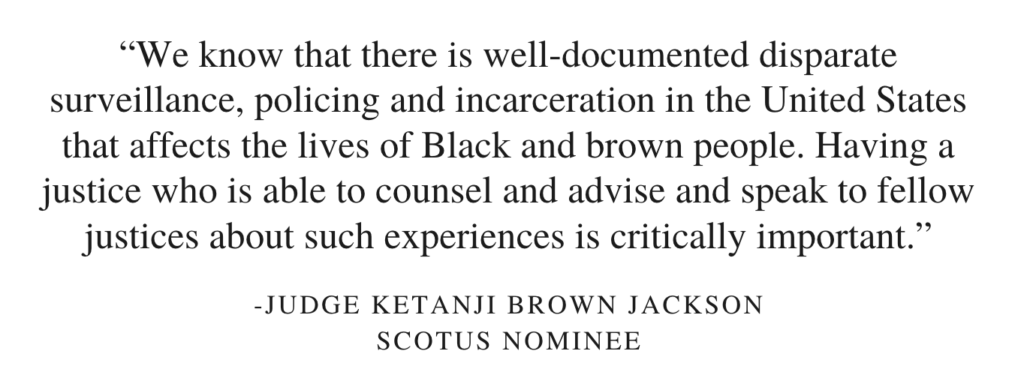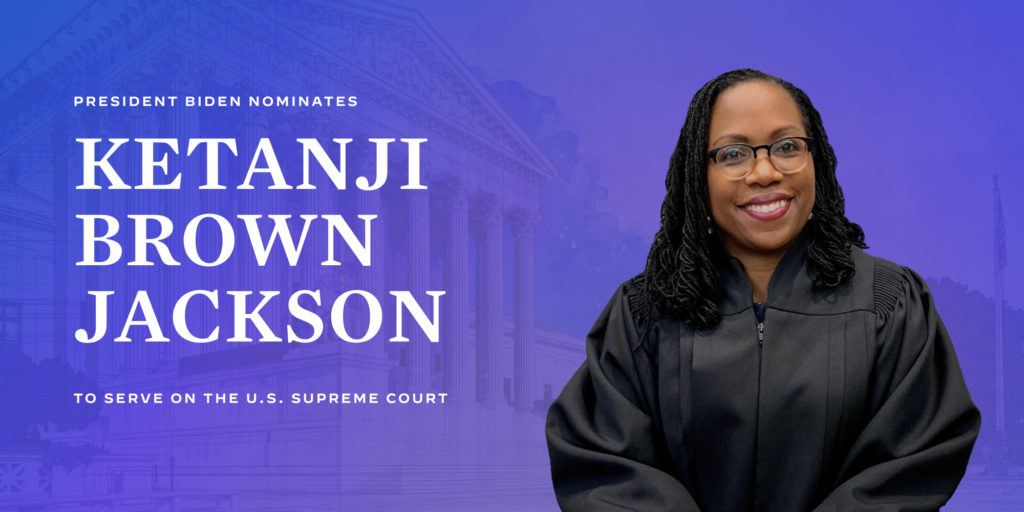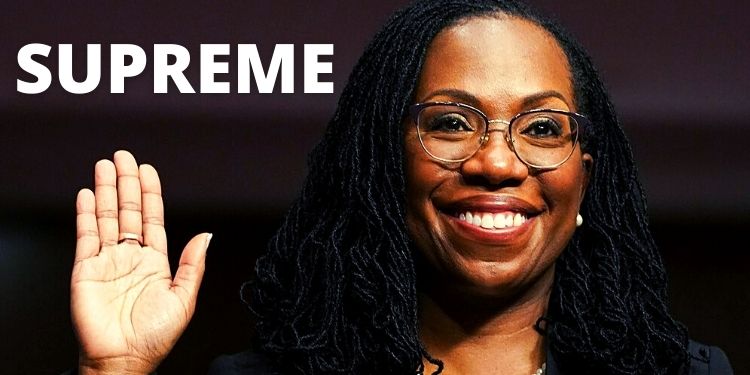President History made: Judge Ketanji Brown Jackson to be first Black woman nominated to the Supreme Court
If confirmed, Jackson, 51, would also be the first former federal public defender on the high court
If confirmed, Jackson will be the first Black woman — and the first former federal public defender — on the nation’s highest court in its 232-year history. While she would not shift the Supreme Court’s ideological makeup, she brings a distinct life experience and professional background to the court that serves as the final arbiter of law. Of the 120 justices who have served in its history, 115 have been men, and 117 have been White.
Now, with Justice Stephen Breyer set to retire at the end of the court’s term in early summer, Jackson will have the opportunity to make history.
“I believe it’s time that we have a court that reflects the full talents and greatness of our nation with a nominee of extraordinary qualifications and that we inspire all young people to believe that they can one day serve their country at the highest level,” Biden said in his Friday announcement, flanked by Jackson and Vice President Kamala Harris, who also made history as the first Black and Asian American woman to hold that title. Jackson “steps up to fill Justice Breyer’s place on the court with a uniquely accomplished and wide-ranging background,” he continued.
Jackson, 51, who has been a federal appellate court judge since June of last year, would be the second justice with a criminal defense background appointed to the nation’s highest court. Jackson has been a rumored favorite for a Supreme Court vacancy since Biden nominated her last year to the U.S. Court of Appeals for the D.C. Circuit, a court that has been a stepping stone for several Supreme Court justices. In 2016, she was on then-President Barack Obama’s shortlist to replace Justice Antonin Scalia after his death.
After Biden announced her Supreme Court nomination, Jackson gave brief remarks, thanking Biden, Harris, Breyer, her family and God, stating that “one can only come this far by faith.” She also drew a line between herself and Constance Baker Motley, the first Black woman to become a federal judge, with whom Jackson shares a September 14 birthday.

“Today I proudly stand on Judge Motley’s shoulders, sharing not only her birthday, but also her steadfast and courageous commitment to equal justice under law,” Jackson said at the White House. “Judge Motley’s life and career has been a true inspiration to me. “
The personal significance of that connection was evident as Jackson spoke. Legal scholars and supporters said they hope Jackson’s nomination can open more doors for people from a range of backgrounds to fill seats on the nation’s courts.
“With Judge Ketanji Brown Jackson’s nomination to the court, what we see is a potential justice with the matching credentials of justices who are currently sitting on the court, but she also brings a background that is far more diverse than many judges currently on the court,” said Michele Goodwin, a law professor with the University of California, Irvine, and an executive committee member of the ACLU. “Americans have yet to see a full and broad diverse representation of themselves by judges on the court.”
Jackson was born in Washington, D.C., and raised in Miami from the age of 3 by her parents, who were both public school teachers and graduates of historically Black colleges. In a 2017 speech at the University of Georgia School of Law, Jackson said her interest in the law started at an early age while watching her father study when he was attending law school.
She was a star debater at her public high school, an activity she said shaped her legal career. “That was an experience that I can say without hesitation, was the one activity that best prepared me for future success in law and in life,” Jackson said then. “I learned how to reason and how to write, and I gained the self-confidence that can sometimes be quite difficult for women and minorities to develop at an early age.”
Jackson went on to receive her bachelor’s and law degrees from Harvard University. After school in 1999, she obtained a clerkship with Breyer, a prestigious opportunity that has long been out of reach for many women of color. One 1998 report published in USA Today analyzed racial backgrounds of the 394 law clerks hired by the sitting justices during their entire tenures. It determined that, at that point, less than 2 percent of the justices’ clerks had been Black, even fewer were Hispanic, about 5 percent were Asian and about 25 percent were women. An update written in 2018 found that since 2005 about 85 percent of all Supreme Court law clerks have been White.

In her remarks Friday, Jackson noted the impact of her clerkship with Breyer, who she said not only “gave me the greatest job that any young lawyer could ever hope to have, but he also exemplified every day in every way that a Supreme Court justice can perform at the highest level of skill and integrity, while also being guided by civility, grace, pragmatism and generosity of spirit.”
Jackson’s career after the clerkship included a number of positions both in private practice and in government. She worked as the assistant special counsel on the U.S. Sentencing Commission under then-President George W. Bush from 2003 until 2005. She later returned in 2010 to serve as vice-chair for the commission under Obama. During her tenure, the commission amended its guidelines for offenses related to crack cocaine in a move meant to address disparities in punishment for crack and powder cocaine offenses, a difference that had meant disproportionately harsh sentences for Black offenders.
“The Commission first identified the myriad problems with a mandatory minimum statute that penalizes crack cocaine offenders 100 times more severely than offenders who traffic in powder cocaine,” Jackson said in a 2011 Sentencing Commission meeting. “Today, there is no federal sentencing provision that is more closely identified with unwarranted disparity and perceived systemic unfairness than the 100-to-one crack-powder penalty distinction.”
This work on the commission, in addition to her time as an assistant federal public defender from 2005 until 2007, helped Jackson gain support from civil rights advocates and progressive groups. One group, Demand Justice which was created in 2018, listed Jackson on its own Supreme Court shortlist in 2020. Academics and advocates note the uniqueness of her public defender background in a world where justices tend to be former prosecutors or corporate lawyers.
“It’s incredibly important to have lawyers who have experience sitting at the table with real-life people and understanding their needs and defending their rights,” Christopher Kang, a co-founder of Demand Justice, previously told The 19th.
Jackson said in one of her confirmation hearings that she viewed the public defender role as an opportunity to help people in need and was struck by how little her clients understood the criminal legal process.
If Jackson is confirmed, she will not change the 6-3 conservative supermajority that currently exists. But the addition of her social and professional experiences can help inform the court’s decision making, said Angela C. Robinson, a retired Connecticut state judge and visiting associate professor of law with Quinnipiac University.
“When you bring different life experiences, you can add to the dialogue you can bring to the dialogue as a group itself, which is homogeneous, may not know,” Robinson said.
The only other Supreme Court justice in U.S. history with a criminal defense background was Thurgood Marshall, who became the nation’s first Black justice in 1967. Biden worked briefly as a public defender early in his career and has made a point to nominate more former public defenders to federal courts. Adding Jackson to the highest court could give her an opportunity to elevate realities that few other justices can speak on, Goodwin said.
“The United States leads the world in mass incarceration,” she said. “We know that there is well-documented disparate surveillance, policing and incarceration in the United States that affects the lives of Black and brown people. Having a justice who is able to counsel and advise and speak to fellow justices about such experiences is critically important.”
Now that Jackson has been officially selected as the nominee, the Senate Judiciary Committee, led by Durbin, will collect and review documents and background information to prepare for the confirmation hearings. The average length of time from nomination to confirmation is a little more than two months, according to the Congressional Research Service. Justice Amy Coney Barrett was confirmed within 27 days of her nomination, making her confirmation one of the fastest.





